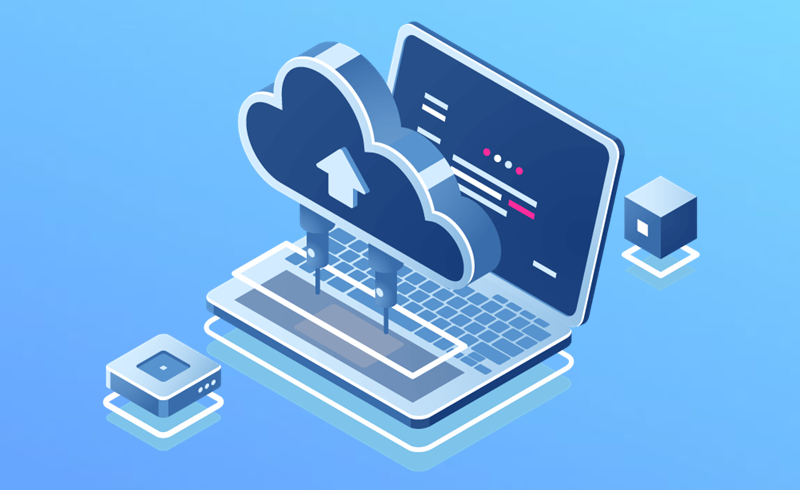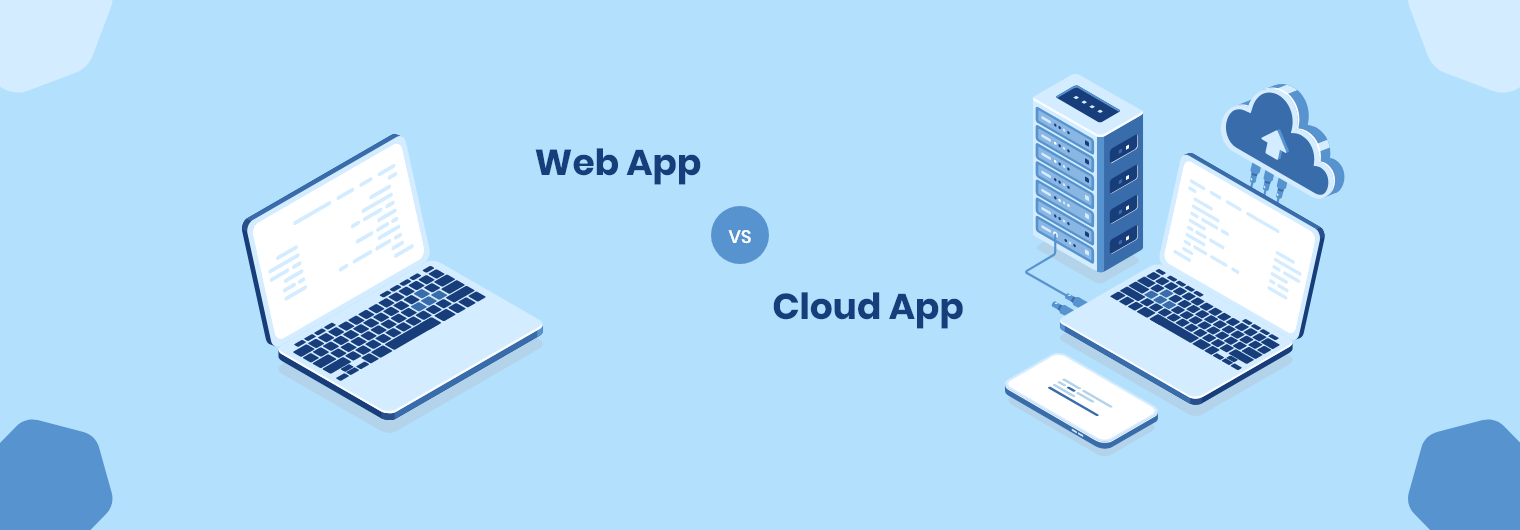Web App vs Cloud App – Complete Guide
- DevOps
- June 19, 2020
Web based vs. Cloud based Apps has become a key consideration in today’s digital landscape, as apps prove to be indispensable tools for everyone—from online shoppers to multinational enterprises. They drive increased sales, boost audience engagement, streamline business processes, and enhance communication. Web apps, in particular, are on the rise, with Gartner reporting that 91% of enterprises have deployed mobile apps, including conversational apps, voice apps, and chatbots.
Meanwhile, cloud computing statistics reveal that 90% of businesses are adopting multi-cloud platforms to harness their benefits. This growing trend has positioned web apps and cloud apps in fierce competition. While they share similarities in usage, their technical differences are significant.
In this blog, we’ll explore these differences in detail to help you make an informed choice in the debate of Web app vs. Cloud App.
What are Web Apps?
Web app utilizes a web browser and web technology to carry out tasks over the internet. Since a web-based application is designed to be used on a web browser, it must have a continuous internet connection to function.

Common examples of web apps include apps used by online retail stores, online banking, e-ticketing, and even social media apps.
The Benefits of Web Apps
There are several benefits of using web apps, the obvious strong points being:
- Accessible from anywhere and through any web browser.
- Run on multiple platforms regardless of the operating system or device, making them cross-platform compatible.
- Can access web apps easily if the browser is compatible, reducing the chances of any compatibility issues.
- Web apps require less support and maintenance from the developer’s end and have lower requirements for the end user’s computer. It helps reduce costs for developers and ease usability for the customer.
- Web apps allow users to use them without having to download the app, hence eliminating any space limitations.
- Client information is not stored. Therefore the data servers of the enterprise must retrieve and verify the information. This reduces piracy in subscription-based web applications.
- Web apps can be updated and maintained without the need to reinstall the software on thousands of devices.
What are Cloud Apps?

For some developers, a cloud app is considered to be an evolved web app. But for an app to develop into a cloud app, it should possess the following features:
- Cloud apps can be used through the web browser or installed on devices and utilized through an internet connection on smartphones, PCs, etc.
- Data is kept remotely in a cloud or cloud-like infrastructure.
- Data should be able to be cached locally to support full offline mode.
- Cloud apps can support different user requirements through customization.
- They offer various services to cater to the user’s needs, such as storage, backup, security, etc.
Google, Yahoo, and Microsoft are renowned cloud apps. But besides these typical examples, other popular cloud apps include Salesforce, Dropbox, NetSuite, Evernote, Zoho, and much more.
The Benefits of Cloud Apps
The purpose of cloud apps is to offer users the opportunity to work conveniently, whether it’s through on-demand services or the availability of network or access to shared pooled resources. So the benefits of cloud apps include:
- Minimal management effort or service provider interaction.
- Users can customize on-demand services to match personal needs and requirements. There is a sense of location independence, offering access to information from any place or device.
- Cloud apps provide broad computing capabilities, offline as well as online.
- With cloud apps, customers often do not buy the software but pay for the services which it provides. As a result, users get quick access to necessary applications through a cloud server.
- Even when a customer does not install software on the servers, they can use the app’s functionalities.
- The availability and performance of cloud services can streamline work processes and enhance profitability.
- Since resources are pooled, cloud apps can serve multiple consumers with different physical and virtual needs.
- Cloud systems help businesses to scale rapidly outward, whether it involves storage, processing, memory, network bandwidth, etc.
- Resource use can be monitored, reported, and controlled, provides transparency to consumers and resource providers.
- The pricing of the app can be based on actual usage of the software.
Differences Between Web Apps and Cloud Apps
There are a few distinguishing features that help differentiate cloud apps from web apps. So let’s dive a bit deeper.
1. Web Apps vs Cloud Apps: Structure Differences
The key difference between web and cloud apps is the structure. While both need access to online services via the internet, cloud apps do not always depend on web browsers to function. Cloud apps are accessible from anywhere, even without the web interface. They can perform tasks from a local workstation.
2. Web Apps vs Cloud Apps: Ease of Customisation
Web apps are not generally designed to have the ability of multi-tenancy; that is, they don’t support the varying requirements of different consumers. On the other hand, cloud apps offer multi-tenancy and can support various needs and requirements of users. Moreover, cloud apps ensure customization features to enhance functionalities. Web apps do not provide the same level of functionality or customization options.
3. Web Apps vs Cloud Apps: Uptime and Sync
Cloud apps are supported by a sophisticated back-end that warrants uptime, security, and integration with other systems. Moreover, it allows multiple access methods and supports scalability. It requires data mirroring and rapid data synchronization. Web apps cannot do as much because they are stored on a remote server and delivered over the internet through a browser interface.
4. Web Apps vs Cloud Apps: Security and Enterprise Data
While web apps retrieve and verify client information from an enterprise’s data servers, cloud apps can enhance security measures for sensitive information. Security enhancements can be added to cloud environments to ensure cloud apps are more secure.
Choosing Between Web Apps vs Cloud Apps
App development is transforming at a substantial pace. User touchpoints and their frequencies have increased. Moreover, the change in device types now means that the future of app development will focus on a multi-dimensional experience.
There is no denying that web browsers are continuing to serve consumers as the most popular touchpoint. This trend will continue to increase as immersive, and voice-driven devices infiltrate our lifestyles. So as the modes of interaction grow, so will the need for web apps.
Therefore, an optimized web-based app that performs smoothly will boost UX and convert prospects into sales. Moreover, a higher customer reach can help increase profitability.
But virtualization technology is encompassing entire businesses. Processes are being re-engineered to incorporate the cloud-based services for software delivery and data handling.
As we enter the digital era with full speed, apps will need to be built to support multiple online activities. And enterprises are recognizing the benefits of adopting cloud computing.
With the COVID-19 pandemic, the case for cloud technologies couldn’t have been stronger. Cloud computing can transform the way people will relate to information and technology. Moreover, it is proving to be an effective mechanism in deploying and supporting management services.
But above all, cloud apps are fostering corporate efforts by helping to add more value to the business. As they draw in resources from both internal and external sources, enterprises can work more effectively towards achieving their business goals.

Final Thoughts
Service providers and app developers will need to reel in the advantages of various technologies to align with consumer needs. But with the availability of more advanced development platforms and frameworks, there is so much potential brimming on the horizon.
However, one thing is for sure. The new technological age demands apps that are affordable, responsive, and agile. Custom-built, multi-tenancy apps that offer alternative access methods will be the norm.







